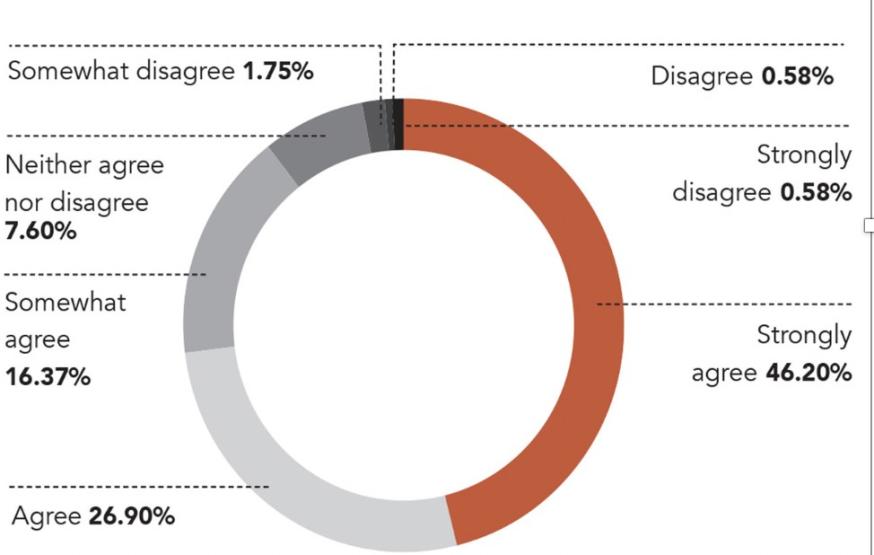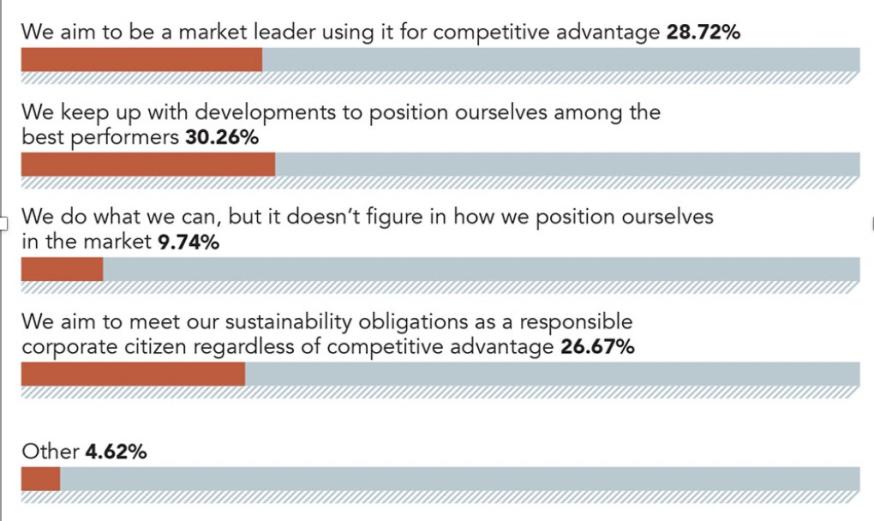
With the 2020 target dates of the Unilever Sustainable Living Plan (USLP) fast approaching, and the recent departure of sustainability champion Paul Polman as CEO, it will be interesting to see whether the firm can maintain its profits and reputation for sustainability excellence under the leadership of Alan Jope.
At the very least, Jope can count on working with directors who support sustainability and know the importance of incorporating it into broader company strategy. That the company is on track to meet around 80 percent of its USLP commitments suggests two things. First, its board members understand that their corporate sustainability obligations extend beyond a fiscal responsibility to shareholders. Second, they see that integrating sustainability into a company’s purpose and processes is vital to the company’s success and the longevity of the planet.
Unilever is not alone. The recent Board Agenda (BA) and Mazars survey, Leadership in Corporate Sustainability– European Report 2018, developed in association with INSEAD Corporate Governance Centre, suggests that board members increasingly recognise the need to incorporate sustainability into business practice.
Regrettably, it also indicates that there is a substantial gap between their aspirations and the capacity of their boards and firms to deliver.
Sustainability obligations exceed the fiduciary
While the business case varies from firm to firm (or even within a firm), there is broad agreement today that thinking sustainably makes financial sense. Shareholders increasingly recognise that the integration of environmental, social and governance factors into business practice is key to managing risk and creating long-term value for the company.
Unfortunately, with social and environmental challenges escalating, we are reaching a tipping point where market-led actions are no longer enough. Boards now need to look past minimising carbon emissions and other “low-hanging fruit”. They must make the difficult decisions necessary to develop sustainable practices throughout core business activities and often complex supply chains.
Responses to the BA survey suggest boards are aware that their companies cannot be successful in the long term without considering the communities they work in and the natural environment they depend on.
Of the 234 business leaders polled (across ranks and company sizes), three quarters believe that ignoring sustainability will affect their company’s ability to create long-term value (see Figure 1). Almost a third indicated that their organisations aim to be market leaders in sustainability and a further 30 percent aim to be seen as strong performers (see Figure 2). More than a quarter said that sustainability was part of their firms’ obligations outside a purely business case. Albeit a minority, these respondents pointed to their moral responsibilities for incorporating sustainability into business strategy.
FIGURE 1: DO YOU AGREE THAT IGNORING SUSTAINABILITY WILL AFFECT YOUR COMPANY’S ABILITY TO CREATE VALUE IN THE LONG TERM?

FIGURE 2: YOUR COMPANY HAS A CLEAR IDEA OF WHERE IT IS TRYING TO POSITION ITSELF ON SUSTAINABILITY.

While this is encouraging, the business leaders' awareness does not necessarily extend to identifying the policies that need to be in place or the information required. It seems boards are only starting to appreciate the complexity of sustainability and the difficulties their companies face in addressing it.
Only half the respondents could say with any certainty that their companies’ sustainability principles and intentions were delivered by effective business policies. Around 30 percent indicated their policies may not be up to the mark.
In fact, the responses suggest a pronounced lack of specific sustainability knowledge among boards:
- Only 50 percent said they believed their company had the right information and measures in place for it to understand its position, ambition and progress on sustainability.
- More than 20 percent indicated that board members struggled to see how sustainability fitted into their company strategy, or had no one on the board with specialised knowledge or interest.
Nearly two thirds of surveyed companies do not require any sustainability expertise or mindset when recruiting board members (executive and non-executive directors). Less than a third have a head of sustainability who reports to the board, either directly or via the CEO. Only 17 percent of boards have a dedicated sustainability committee.
Given the growing societal awareness and demand for companies to conduct their business sustainably, one has to ask, what can boards do to be more engaged with sustainability?
Immediate actions
To help boards turn their sustainability aspirations into actions, we have identified six points where immediate action can be taken. We have also included some difficult questions board members should be asking.
1. Revisit company statements of purpose.
- What does value creation mean to your company?
- Is there a comprehensive view of how the world is changing – not least in regard to climate change – and the role your organisation plays in that changing world?
- How is your company creating societal progress and does your corporate culture effectively support this?
- Is this consistent with contemporary sustainability demands and principles?
- Is it aligned with the SDGs?
2. Arrange a meeting of the entire board for the sole purpose of discussing what sustainability means to the organisation. Compare leading-edge sustainability practices with your own and leave ample time for an in-depth analysis of:
- the risks and opportunities into the medium and long term,
- the gaps between current sustainability performance and where the organisation needs to be,
- the strategies already in place for getting there, and those identified for future development,
- the board’s sustainability priorities in the short, medium and long term, noting where they intersect with the board’s understanding of company purpose.
3. Audit the board members’ sustainability expertise and mindset.
- Is it adequate to embed sustainability thinking into board processes, risk management and investment decisions such as M&A and innovation?
- To what extent does the board need to prioritise recruitment of new members and is any specialist expertise required?
- Does board membership need to evolve to better reflect sustainability priorities?
4. Evaluate the adequacy of the sustainability information provided to the board.
- How are the organisation’s sustainability goals translated into metrics?
- What information is currently reported?
- What further information is required?
- Does the board have benchmark data on its performance and that of competitors?
- Are the right KPIs in place for management?
- Are they part of an overall dashboard, integrating sustainability metrics with other performance metrics?
- Are additional resources needed to better understand or investigate data on the firm’s sustainability performance?
5. Organise the board to ensure its oversight on sustainability is effectively managed.
- Which board committees should be deeply involved?
- Should there be a sustainability committee and how will its deliberations be brought to the main board?
- Would an independent expert panel help to challenge board actions and progress?
6. Explore how the firm engages with, and learns from, its critics – NGOs and others. Does the board need to hear from them independently?
In 2012, Polman showed that Unilever was a company ahead of its time when he told The Guardian,
“What we firmly believe is that if we focus our company on improving the lives of the world's citizens and come up with genuine sustainable solutions, we are more in sync with consumers and society and ultimately this will result in good shareholder returns.”
These sentiments may have been extreme for the time. However, seven years on, consumers expect companies to think beyond the bottom line.
Research suggests that an increasing number, if not a majority, of board members today recognise that their sustainability responsibilities have changed. It is now up to them to ensure they are equipped with the knowledge and people to better meet these obligations.






No comments yet.